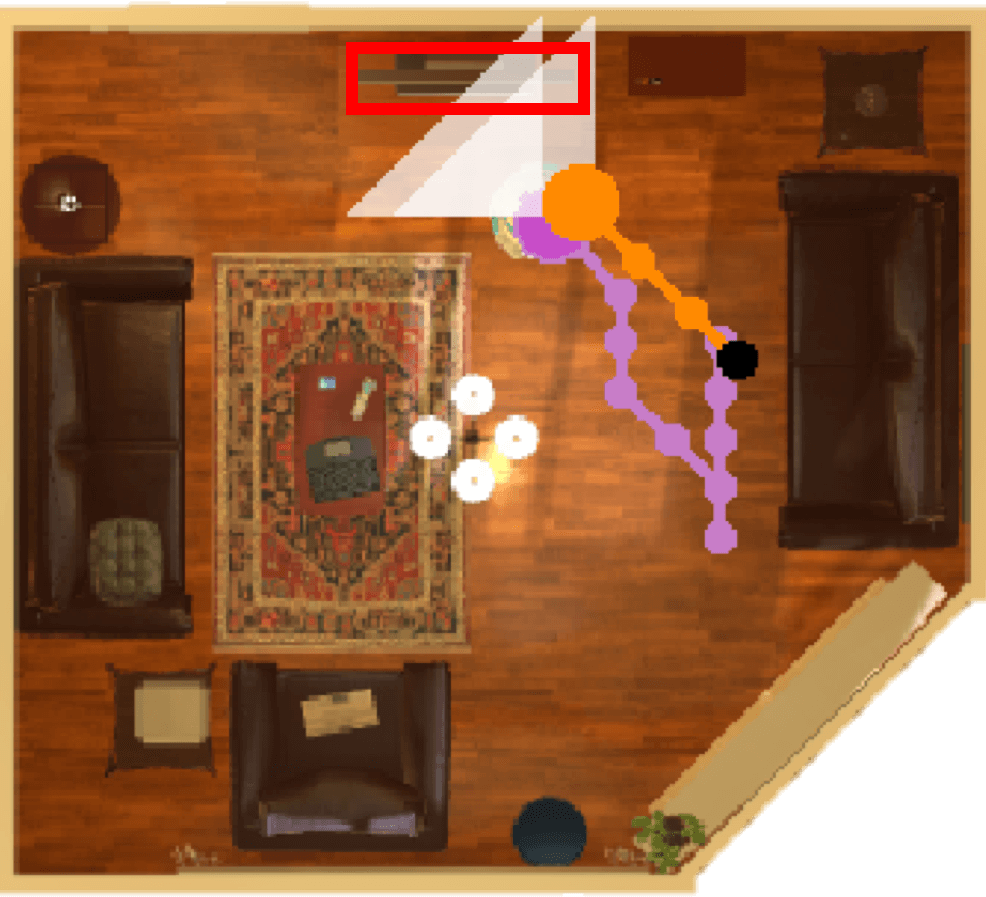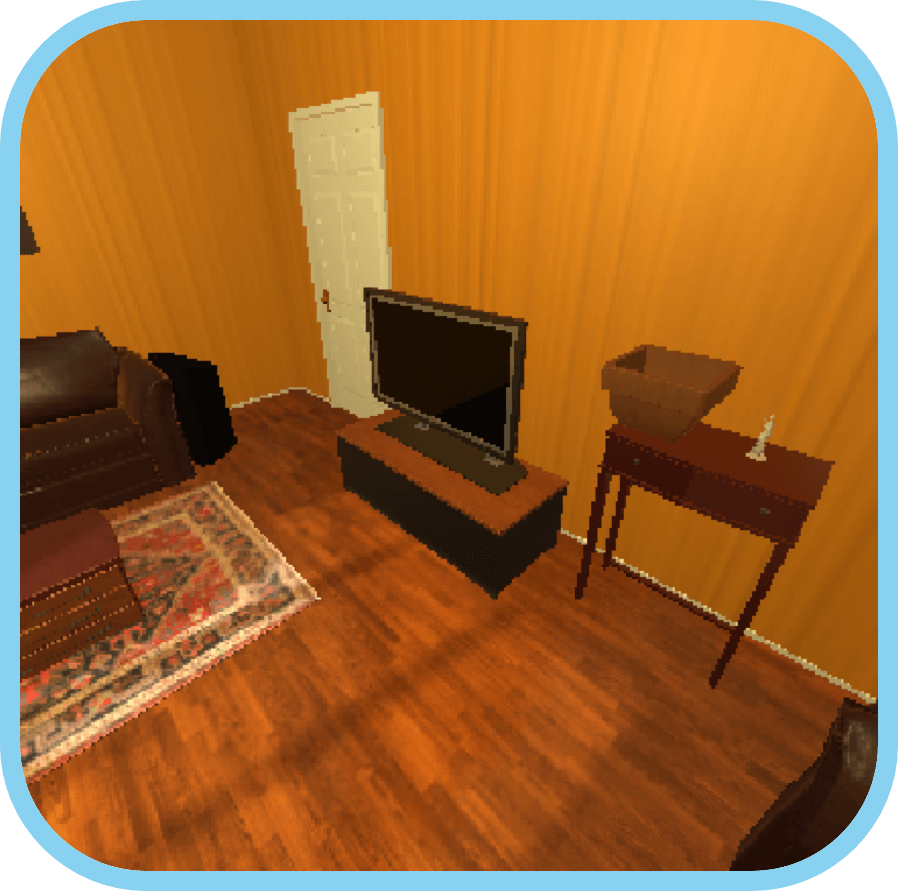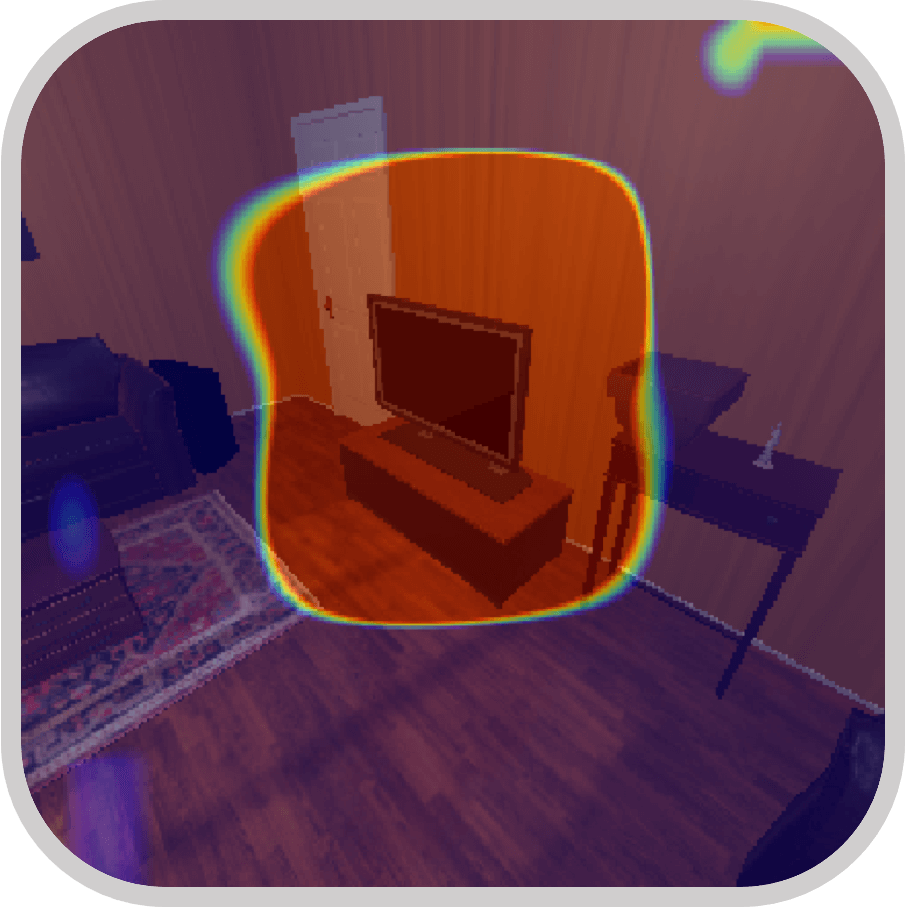Visual Navigation with Spatial Attention
By Bar Mayo, Tamir Hazan and Ayellet Tal (CVPR 2021).
| (a) Paths | (b) Our's agent view | (c) Our attention | (d) SAVN agent view |
|---|---|---|---|
 |
 |
 |
 |
We present a novel attention probability model for visual navigation tasks. This attention encodes semantic information about observed objects, as well as spatial information about their place. This combination of the "what" and the "where" allows the agent to navigate toward the sought-after object effectively. In the figure above (a) The agent aims at finding a TV (red rectangle) in a living room (top view), starting from a given location (black circle). Our agent's path is marked in orange and SAVN path is in magenta. At each step, the agent is given a specific view, depending on its position. In this example, our agent starts by turning around in its starting location to gather information---a strategy it has learned. (b) shows our agent's view before the first move forward, whereas (d) shows SAVN view before its first move forward.
Citing
If you find this project useful in your research, please consider citing:
@misc{mayo2021visual,
title={Visual Navigation with Spatial Attention},
author={Bar Mayo and Tamir Hazan and Ayellet Tal},
year={2021},
eprint={2104.09807},
archivePrefix={arXiv},
primaryClass={cs.CV}
}
Results
| Model | SPL ≥ 1 | Success ≥ 1 | SPL ≥ 5 | Success ≥ 5 |
|---|---|---|---|---|
| Our (A2C) | 17.88 | 46.20 | 15.94 | 32.63 |
| Our (A3C) | 16.99 | 43.20 | 15.51 | 31.71 |
| SAVN | 16.15 | 40.86 | 13.91 | 28.70 |
| Scene Priors | 15.47 | 35.13 | 11.37 | 22.25 |
| Non-Adaptive A3C | 14.68 | 33.04 | 11.69 | 21.44 |
Setup
-
Clone the repository with
git clone https://github.com/barmayo/spatial_attention.git && cd eotp. -
Install the necessary packages. If you are using conda then simply run 'conda create --name --file requirements.txt`.
-
Download the pretrained models and data to the
eotpdirectory. Untar with
tar -xzf pretrained_models.tar.gz
tar -xzf data.tar.gzThe data folder contains:
thor_offline_datawhich is organized into sub-folders, each of which corresponds to a scene in AI2-THOR. For each room we have the ResNet 18 features of all possible locations in addition to a metadata and NetworkX graph of possible navigations in the scene.thor_glovewhich contains the GloVe embeddings for the navigation targets.
Note that the starting positions and scenes for the test and validation set may be found in test_val_split.
If you wish to access the RGB images in addition to the ResNet features, replace thor_offline_data with thor_offlline_data_with_images. If you wish to run your model on the image files,
add the command line argument --images_file_name images.hdf5.
Evaluation using Pretrained Models
Use the following code to run the pretrained models on the test set. Add the argument --gpu-ids 0 1 to speed up the evaluation by using GPUs.
Our (A2C)
python main.py --eval \
--test_or_val test \
--episode_type TestValEpisode \
--load_model pretrained_models/EOTP_A2C_alpha_SE_66502810_4500000_2020-09-28_09:06:40.dat \
--model EOTP \
--results_json eotp_a2c_test.json
cat eotp_a2c_test.json Our (A3C)
python main.py --eval \
--test_or_val test \
--episode_type TestValEpisode \
--load_model pretrained_models/EOTP_final_75614446_5000000_2020-10-09_16:54:35.dat \
--model EOTP \
--results_json eotp_a3c_test.json
cat eotp_a3c_test.json How to Train your models
You may train your own models by using the commands below.
Training
python main.py \
--title eotp_train \
--model EOTP \
--gpu-ids 0 1 \
--workers 12How to Evaluate your Trained Model
You may use the following commands for evaluating models you have trained.
Evaluate
python full_eval.py \
--title EOTP \
--model EOTP \
--results_json eotp_results.json \
--gpu-ids 0 1
cat eotp_results.jsonAcknowledgement
In this work we based our code on SAVN implementation. Please cite the original SAVN if you use their part of the code.